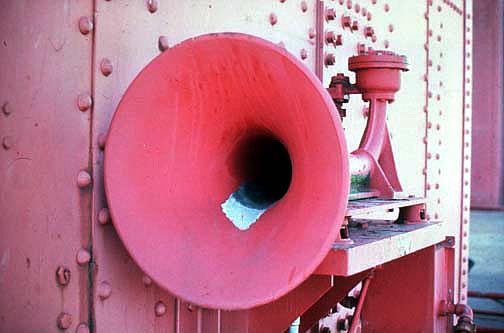 Nights when it's foggy, of which there are many, feature a sound those not familiar with San Francisco might be strangers to, at least other than in theory: foghorns. Depending on where you live in the city, what season it is, and what condition the night or wee morning finds you (thin air, thick air, windy, calm, humid, dry), you can hear them sometimes from as far as the Mission and I imagine from other points of equal if not greater distance which I've yet to venture into on late foggy evenings. Where I live, just shy of the bay itself and at the very uppermost point of one of those seven famous San Franciscan hills, where the air is often insubstantial and biting and the Golden Gate is but a short bike ride away, I hear their klaxon frequently as they direct ships coming in underneath the Golden Gate's crimson awnings all night for as long as both she and her beclouding fog persist in intervals sometimes as short as 30 or 40 seconds. At first, this might sound like a nuisance. How can you sleep? But the truth couldn't be further; like a goodnight kiss it's soothing, calming, lulling, and at the same time exciting, a companion when I'm trying to get through some work during these dim, depopulated hours of the night. Below, you can see why foghorns might be a necessity here.
Nights when it's foggy, of which there are many, feature a sound those not familiar with San Francisco might be strangers to, at least other than in theory: foghorns. Depending on where you live in the city, what season it is, and what condition the night or wee morning finds you (thin air, thick air, windy, calm, humid, dry), you can hear them sometimes from as far as the Mission and I imagine from other points of equal if not greater distance which I've yet to venture into on late foggy evenings. Where I live, just shy of the bay itself and at the very uppermost point of one of those seven famous San Franciscan hills, where the air is often insubstantial and biting and the Golden Gate is but a short bike ride away, I hear their klaxon frequently as they direct ships coming in underneath the Golden Gate's crimson awnings all night for as long as both she and her beclouding fog persist in intervals sometimes as short as 30 or 40 seconds. At first, this might sound like a nuisance. How can you sleep? But the truth couldn't be further; like a goodnight kiss it's soothing, calming, lulling, and at the same time exciting, a companion when I'm trying to get through some work during these dim, depopulated hours of the night. Below, you can see why foghorns might be a necessity here. 

Para mí, esto es una tendencia. I've always lived near a hub of transportation of some kind or another. A major freeway where the cars never stopped speeding by and their piercing headlights never turned off, an airport where the planes continued to soar in every so often, a line of train tracks that shook with steely life or a cable car line that buzzed and chugged all night long, or a simple foghorn belting out its directionless call for direction, bringing someone, anyone home, keeping them safe despite the inclemencies, or simpler still, a window facing the street through which to hear the constant percussion of footsteps and passing bursts of conversation, laughter, and frustration. Without these things, I don't think I could comfortably live there. Without the obstinate reminders that there is an ever-moving complex force of life outside my windows, I wouldn't want to live there.
Besides all that, the distinct cry of the foghorn is a bit of a reminder of the past, a time when harbors reigned supreme for cities whose sole propriety in an early stage of America depended on these piers and docks and busy waters and so too on these anonymously-sent aural signals. This way, this way, come this way, they seem to say. We have warm food and drink. You're almost there. In all their literal, philosophical, and symbolic glory they are nothing but directions sent out blindly and without prejudice whether or not there is anyone waiting to hear them. It's romantic, in a quaint, antebellum kind of way, no? I think that, in part, is what I enjoy so much about San Francisco, how it exists with one foot in squarely placed into a progressive future and the other reaching back to this gold-richened past, dated cable car systems, taverns and bars almost 100+ years old, old shoddy buildings and diners, and this funny little horn, all imprints of yesteryears. As I was peddling home one night after a literary reading that afterwards relocated to someone's apartment and extended by dint of wine deep into the night, I could hear the bleating foghorn from afar getting louder as the distance between us shrunk. That noise gave a sensation of unification; there is someone out there, there are boats and ocean liners navigating the dark seas, there are people walking and paying attention and life, in general, carrying on, much like the very currents carrying those ships, without us and at the same time with us. And in a world that can increasingly feel as if it has shattered completely into ruinous seclusion, insularity, and great divides of loneliness and confusion, that feeling is a reaffirming one. The irony, of course, is that foghorns aren't manned by anyone; they merely do what they're scheduled to do. We either hear them or we don't; we ignore or we pay attention, ears open. I don't know if I can quite say why these cries are meditative, because I don't know if I fully understand myself, but they are and always will be a welcomed pleasure.
No comments:
Post a Comment